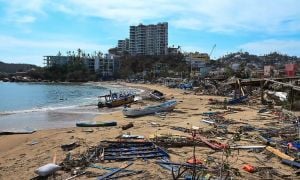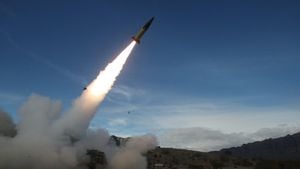Recent developments surrounding U.S.-Russia prisoner exchanges have highlighted not just the complex negotiations but also individual voices pleading for their own fates amid geopolitical tensions. One significant case involves Yaroslav Shirshikov, a Russian public relations expert currently serving five years for charges related to "justifying terrorism" through online commentary. This situation has gained attention after Shirshikov, who accompanied Wall Street Journal reporter Evan Gershkovich during his last reporting trip before Gershkovich was arrested, has publicly asked not to be included in any potential prisoner swaps.
Shirshikov's predicament reflects the personal stakes involved for those caught up in these exchanges. He made his request known via his supporters on Telegram, emphasizing his desire to remain incarcerated rather than be part of international negotiations. "I prefer to address my questions to the authorities of my country without the assistance of foreign governments," he stated. His plea carries the weight of someone identified as a political prisoner, expressing his willingness to stay true to his principles even at the cost of his freedom.
The backdrop to Shirshikov’s plea involves growing speculation about forthcoming prisoner exchanges between Russia and the United States, projected for February 2025. His case is not isolated. Ksenia Karelina, another dual U.S.-Russian citizen, is also awaiting her fate after being detained for contributing to aid efforts for Ukraine. A prominent lawyer representing Karelina indicated the possibility of negotiations reviving again soon, aligning with Shirshikov’s concerns.
Adding to the debate, Boris Kagarlitsky, another activist currently imprisoned under similar circumstances, has made headlines by asserting his intent to sue any foreign government attempting to include him in future deals. This declaration underlines the unique position these prisoners find themselves in, caught between national loyalty and the broader geopolitical maneuverings taking place around them.
Shirshikov's and Kagarlitsky’s statements contribute to the overarching narrative of how personal stories intermingle with diplomatic relations. Their voices speak to the existential dilemmas faced by those labeled as political prisoners and those whose lives are entangled with key figures like reporters and activists. This dynamic complicates the narrative of prisoner swaps as not merely transactional but deeply personal.
Within the current atmosphere, where tensions are high, any potential swap carries significant emotional burden, representing not just political negotiation but human lives and rights. The Russian authorities recently announced the prospect of exchanges, echoing through the halls of power and justice alike, stirring hope among families of detainees yet fear among the prisoners themselves who wish to avoid being pawns.
The situation requires observers and international stakeholders to acknowledge the individuality of these prisoners. Many stand on principle, unyielding to external pressures, determined to face their fate head-on without succumbing to the shadows of their circumstances. This drive for autonomy can complicate international efforts to resolve their situations, as seen with Shirshikov and his affirmations.
The lens through which we view Shirshikov’s unique contribution to this issue opens broader discussions about freedom, loyalty, and the sacrifices individuals confront under authoritarian regimes. Dialogue continues as both nations brace for what could be another fraught chapter of negotiations, raising questions about the real stakes involved for those outside the political spotlight yet so heavily affected by its decisions.
Through their heartfelt wishes, these activists remind the world of the human element at play, stressing the need for empathy and awareness of those caught beneath the weight of political pressure rather than reducing their lives to mere case studies or negotiation chips. The experiences of Shirshikov and others signal the harsh reality of political repression, offering glimpses of unwavering spirit even within the prison walls. While negotiations for prisoner exchanges carry hope, they also remind us of the sacrifices made by individuals who remain steadfastly committed to their beliefs, standing firm even as the world around them shifts.



